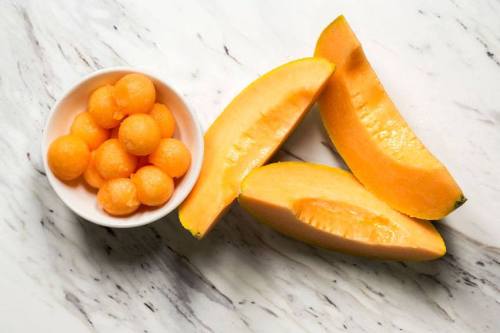Controversial opinion time: The most underrated part of any fruit salad are the melons. Sure, everyone goes for the berries and grapes first, but you’re making a rookie mistake by skipping the cantaloupe chunks sitting forgotten at the bottom of the bowl. Because…well, the benefits of cantaloupe are pretty legit.
“Cantaloupe carries a host of benefits, aside from being delicious!” says Rachel Gargiulo, a certified nutrition consultant at Nourishing Journey Wellness Center. “It is rich in beta-carotenes, an antioxidant that converts into vitamin A in the body, as well as vitamin C. Additionally, its phytonutrient compounds help combat inflammation and oxidative stress.” (The icing on the cake? Cantaloupe is also a keto-friendly fruit. #praise.)
So what does this mean for those who decide to add cantaloupe to their dietary repertoire? Gargiulo provided a more thorough run-down of the major health and nutrition benefits of cantaloupe:
1. Tons of inflammation-fighting antioxidants. In every serving of cantaloupe you get beta-carotene, cryptoxanthin, lutein, and zeaxanthin. (Try saying all of those three times fast.) Gargiulo notes that antioxidants are known for their anti-inflammatory properties, plus they ward off cancer-causing free radicals in the bod. Both beta-carotene (once converted to vitamin A) and zeaxanthin are thought to play key roles in eye health, including reduced risk of age-related macular degeneration.
2. Immune-boosting vitamin C. Okay yes, oranges and mangoes have tons of vitamin C. But one cup of diced cantaloupe has 59 mg of the stuff (about 79 percent of your recommended daily value). That’s a bit more than you’d get from one small orange. Not too shabby, eh? Vitamin C plays key roles in your body’s healing process, protection against damage from free radicals, and absorption of iron. Gargiulo also says vitamin C may boosting the immune system too, reducing recovery time when you catch a cold.
3. Recovery-fueling potassium. If you’re the kind of person who doesn’t like bananas, good news: A cup of cubed cantaloupe has 427 mg of potassium, which is about 11 percent of your recommended daily value. The electrolyte helps maintain the delicate balance of intercellular fluids required for muscle contractions and a regular heartbeat—making it especially important when you are physically active. The next time you finish an intense workout, consider popping a piece of cantaloupe to help boost your recovery.
4. Hydrating water: Cantaloupe’s high water content (just over 90 percent of the fruit is water!) helps hydrate your body—which helps your bod normalize temperature, lubricate joints, and protect the spinal cord. Gargiulo also says adequate hydration is important for healthy digestion and blood pressure levels. So drink (and eat!) up.
5. Gut-saving fiber: A high-fiber diet provides a range of health benefits, including lower levels of bad cholesterol and blood sugar, improved bowel function, healthy weight management, and, a reduced risk of mortality. Cantaloupe contains over five percent of your recommended daily fiber intake, so consider it less of a fix-all and more of a new fiber-rich food to add to your rotation.
6. Low(er) sugar and carb content: If you’ve ever tasted cantaloupe, you know that it’s super sweet—which is surprising in light of its (relatively) low sugar content. A one cup serving of cantaloupe contains just 13 grams of sugar and 13 grams of carbs. For this reason, Gargiulo signs off on cantaloupe (as well as watermelon and honeydew) fruits that are likely okay to consume in moderation on the ketogenic diet, as well as on other eating plans in which sensible intake of carbohydrates is key.
Delicious ways to eat cantaloupe
So now that you’re a cantaloupe convert, what are the best ways to serve it up (beyond just like, biting into the flesh)? Gargiulo provides a few simple suggestions:
- Mix up a hydrating fruit salad with a variety of different delicious fruits.
- Make a cantaloupe and mint salad, perfect for a summer BBQ: “I scoop the cantaloupe into small cubes, chop up a couple tablespoons of fresh mint from my herb garden, and add a tablespoon of fresh, grated ginger. Squeeze lime juice onto the salad, toss, and enjoy!” Gargiulo says.
- Whip up a batch of bacon and cantaloupe bites for a sweet and savory appetizer.
- Prepare a sweet, spicy cantaloupe salsa to use as dip for whole grain tortilla chips or add a layer of flavor to tacos.
- Serve a chilled ginger cantaloupe soup as the first course at a summer luncheon.
The next time you’re standing in the produce section, debating which fruit to purchase, consider cantaloupe as a prime candidate. From flavor to flavonoids, it’s hard to go wrong.
If you’re currently on a fruit kick (I can’t blame you!) check out these low-sugar ones. And here’s why you should give most dried fruit the side-eye.
Sign Up for Our Daily Newsletter
Get all the latest in wellness, trends, food, fitness, beauty, and more delivered right to your inbox.
Got it, you've been added to our email list.











